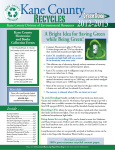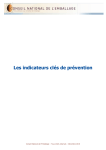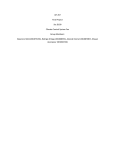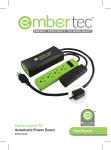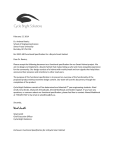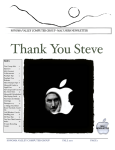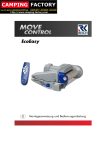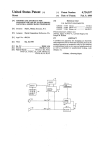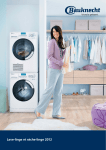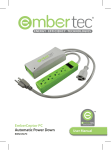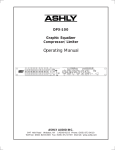Download Important Recycling Information: What you need to know
Transcript
Co Founders: Mouna Chamariq, LEED AP Nazanine Scheuer, MBA [email protected] Important Recycling Information: What you need to know Get the Westchester Quick News You can subscribe to Westchester Quick News by entering your email address and choosing the topics you are interested in: http://www3.westchestergov.com/subscribe Here is the latest news from the Westchester Environment Quick News …………………….. On Thursday County Executive Robert P. Astorino officially opened the county's new state-ofthe-art Household Materials Recovery Facility (aka, the H-MRF). The H-MRF, centrally located on the Grasslands Reservation in Valhalla, offers residents a year-round disposal outlet for those hard-to-get-rid-of household items, including chemicals (pesticides, flammable liquids, pool chemicals and cleaning products), tires, re-chargeable batteries, fluorescent bulbs, Freoncontaining appliances, electronic waste, propane tanks, and confidential documents for shredding. Prescription medicines can be delivered on the first Tuesday of every month. The H-MRF is open three days a week, by appointment. Visit: www.westchestergov.com/hmrf for more information. The H-MRF is intended to replace the Household Material Recovery Days (H-MRDs) held periodically in different locations around the county. Two of these events will be held this year, th with the first to take place on Friday, April 27 , from 12 - 4 and Saturday, April 28th, from 8 - 4. at Playland Park in Rye, NY. ……………………………. Get the iRecycle iphone App. Created by Earth 911. Give you access to over 100,000 recycling and disposal locations for over 200 materials and get directions to them from your current location. It is FREE. . http://earth911.com/irecycle/ What should I do with Milk $ Juice Cartons called Gable tops? What’s the Carton Council is saying? http://www.recyclecartons.com/ ü New York City collects the Gable Tops with the curbside recycling If you hear that they cannot be recycled it is only because the Material and Recovery Facility in Yonkers is a dual stream facility, which means that they pick up the paper & glass separately and they do not have the equipment they need to recycle the gable tops. The MFR in Yonkers has been built n the 80’s, the first one built in the US! Last summer they retrofitted the plastic section and that was very positive news for a building that old. Many people like you are concerned about recycling gable tops and many people gather in groups to express their voice, and now the County is seriously considering recycling those valuable materials. The good news is that MRF in Yonkers will be retrofitting the pulp section, and will be looking for equipment to include the gable tops (Milk and Juice Cartons). It could take up to 3 years, same as the plastics. Building Materials News: Milk and Juice cartons have a strong market in the US, especially with companies like ReWall who makes 100% recycled building materials using the European manufacturing process that is environmentally friendly and does not use added glue, water or chemicals. Check them up on Facebook: http://www.facebook.com/ReWallMaterials What should I do with batteries? • Alkaline batteries are used in everything from cameras and flashlights to remote controls. They no longer contain mercury, but contain metals that can to be recycled. • What is the law? ü In California, it is illegal to throw away any battery even the single use ones. www.cawrecycles.org/living_green/battery_disposal ü In Westchester (and NY in large), you are instructed to put alkaline batteries in with your regular trash. This is partly due to the Mercury-Containing and Rechargeable Battery Management Act passed in 1996 that phased out the use of mercury in alkaline batteries, making them less of an issue when disposed in landfills. But this doesn’t mean alkaline batteries are not recyclable. Recycling these batteries can recover steel and zinc, two valuable metals. In the case of steel, it can be reprocessed into rebar. Check out the battery classification: http://environment.westchestergov.com/householdbatteries. § What should I do? ü Consider mail in programs: The iRecycle kit includes everything you need to recycle your batteries. http://www.batteryrecycling.com/new+iRecycle+kits http://www.batteryrecycling.com/battery+reference+guide+dry+cell/ With the mail in program you can mail in any type of batteries, button cell, alkaline and all that are listed in the reference guide. ü Consider buying Rechargeable batteries Rechargeable batteries can be used many times before disposal, saving you money and reducing the number of batteries that end up in landfills. Be sure to purchase batteries that are appropriate for the equipment you are using. By following charging instructions, you can increase the life of your batteries. Rechargeable Battery Recycling is Mandatory by Law NYS Rechargeable Battery Recycling Law. They are accepted in many locations and at the H-MRF in Westchester: http://environment.westchestergov.com/new-h-mrf What should I do with Wine Cork? You might have seen this CORK REHARVEST bin next to the other recycling bins at Whole Foods Markets. All the Whole Food Markets across the US have a Drop off bin for cork tops. CORK REHARVEST is a non-profit organization: Cork Forest Conservation Alliance” whose mission is to conserve and protect the Mediterranean cork forests and its habitat. How the corks are recycled? http://www.corkforest.org/cork_reharvest.php The Quick Cork Fact column is very informative. The Corks in East Coast is shipped to Chicago. Corkologie is a manufacture that makes a wide variety of consumer products. http://corkologie.com/products_all.html Building Materials News: Because cork is naturally dense, it is slowly affected by water and oxygen and it is not acceptable for molds. Cork is a perfect product to reduce sound. Cork lasts at least 100 years more than wood, which makes it a healthy building material. Sagrada Familia Cathedral in Barcelona, designed by Catalan Antoni Architect Gaudi has been given a beautiful cork floor to quiet the sound. http://www.treehugger.com/greenarchitecture/a-cork-floor-for-the-sagrada-familia-visited-by-millions-each-year-photos.html New York State Law Mandatory Take Back Programs • Plastic Bag Mandatory Take-Back Recycling Program for Residents Plastic bag recycling is governed under NY State's Plastic Bag Reduction, Reuse and Recycling Act. (Assembly Bill A11725/ Senate Bill 8643-A), which requires large retail stores and shopping malls, and medium to large chain stores, to accept clean plastic bags for recycling. Other types of plastic bags, such as plastic dry cleaning bags and plastic newspaper delivery bags, are also accepted at many retailers, although not required. • New York State Wireless Recycling Act Recycle unwanted cell phones and accessories by dropping them off at retail locations sponsoring a take-back program. Under State (not City) law, the NYS Wireless Recycling Act requires all wireless providers who sell cell phones within the state to accept cell phones for recycling. Many wireless providers have in-store collection programs and mail-back programs, where a cell phone can be sent back to the wireless provider for recycling at no cost. In addition, some cell phone manufacturers and general retailers have voluntarily set up take-back programs for cell phones. Please check, prior to taking cell phones to a location. If a provider refuses to recycle your cell phone, contact the NY State Department of Environmental Conservation online or call 1-800-TIPP DEC (1-800-847-7332). ü Manufacturer Take-Back Program: LG Electronics, Mortorola, Nokia, Palm, Samsung, Sony Ericsson, Sprint ü Retailer Take-Back Program: Best Buy, Staples, Office Depot, Lowes • New York State Rechargeable Battery Recycling Law The NY State Rechargeable Battery Law, originally enacted as Chapter 562 of the Laws of 2010, requires retailers to accept from consumers at any time during normal business hours rechargeable batteries of a similar size and shape as the retailer offers for sale. Manufacturers of rechargeable batteries are responsible for advertising the program to consumers, and must finance the safe collection, transport, and recycling of these batteries collected by the retailers. Manufacturers must submit plans for approval by NY State Dept of Environmental Conservation, and comply with regular reporting requirements. Starting December 5, 2011, rechargeable batteries were also banned from disposal throughout NY State. Check the NY State Dept of Environmental Conservation (DEC). NYS Rechargeable Battery Recycling Law This law is written to work in conjunction with Call2Recycle, a free rechargeable battery and cell phone collection program that is operated by the Rechargeable Battery Recycling Corporation (RBRC), a non-profit organization. Check them up and you’ll find many drop off locations near you! http://www.call2recycle.org/locator/. • New York State Electronic Equipment Recycling and Reuse Act NYS law requires manufacturers of covered electronics equipment to collect and reuse their brands of products from residents and small businesses for free. Check out the registered Equipment list: http://www.dec.ny.gov/docs/materials_minerals_pdf/regceemfrs.pdf Best Buy accepts up to three items per household per day free of charge (size restrictions apply). They also offer haul-away and pickup programs for console or large TVs and appliances. http://www.bestbuy.com/site/Global-Promotions/RecyclingElectronics/pcmcat149900050025.c?id=pcmcat149900050025&DCMP=rdr0000181 Goodwill Industries accept any brand of old computers and peripherals (mice, keyboards, printers…) for FREE. Consumers are RESPONSIBLE FOR REMOVING DATA from their computers. http://reconnectpartnership.com/locations.php?zip=10804&x=0&y=0 Some accept TVs.Find a location in your area. http://www.werecycle.com/ Office Depot accepts any brand of used electronics. Check them out http://www.officedepot.com/promo.do?file=/promo/pages/0928_recycling.jsp Sims Recycling Solutions offers NY residents a FREE, postage-paid mail-back program for any brand of electronic equipment http://us.simsrecycling.com/our-services/oemcompliance/new-york. Click here for a label and shipping instructions. Staples & HP have partnered to offer free recycling for all brands of electronics at Staples retail locations across the U.S. The recycling service is available to small businesses and individuals who want to recycle old computers, cell phones, MP3 players, and other electronic devices. http://www.staples.com/sbd/cre/marketing/ecoeasy/recycling.html We Recycle! NY State Residents: As of April 1, 2011 have the option of recycling their used electronics for FREE. This also includes businesses with fewer than 50 employees and nonprofits with fewer than 75. Check out the postage-paid mail-back program for any brand of electronic equipment. http://www.werecycle.com/ • Smoke Detector Mandatory Take-Back Programs Manufacturers of ionization smoke detectors (Most household smoke detectors are ionization smoke detectors, which contain very tiny amounts of radioactive material) must accept returned radioactive detectors for disposal as hazardous waste. They are mandated by the Nuclear Regulatory law 10 CFR 32.27 to see that the radioactive waste is disposed properly at a nuclear waste disposal facility. The address of the supplier is usually listed in the product warranty or user's manual. Please contact the manufacturer before mailing your old smoke detector. Some manufacturers require a fee or have special requirements if the device is no longer under warranty. Do not take the detector apart. However, remove and properly dispose of or recycle the batteries. No special shipping is needed for the smoke detector, just wrap it in padding, place it in a labeled box, and send it. • New York State Mercury-Added Consumer Product Law The Law originally enacted in 2004, bans the sale of mercury-added novelty products, mercuryfever thermometers, mercury thermostats (effective January 2012) and other mercury containing products (effective January 2012) in NY State. Sale of elemental mercury is banned, except for certain scientific, dental, and manufacturing uses. The Law mandates that waste products containing mercury, http://www.dec.ny.gov/chemical/8512.html including fluorescent lamps, CFLs, Fluorescent tubes, must be properly labeled and managed separately from solid waste. You’ll find drop off bins at IKEA and Home Depot. They are also accepted at the H-MRF in Westchester: http://environment.westchestergov.com/new-h-mrf For voracious readers on Recycling and Composting, Visit the New York State Department of Environmental Conservation http://www.dec.ny.gov/chemical/294.html Prepared by Westchesterre Green Living LLC. Co-Founders Mouna Chamariq, LEED AP Nazanine Scheuer, MBA Email [email protected]






